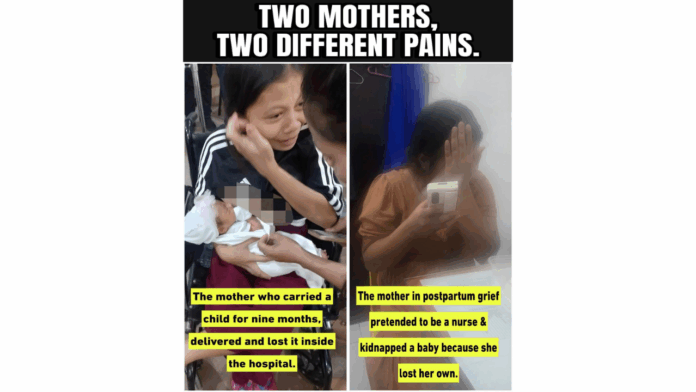Who would have thought that a single Facebook post, only just a few lines long, would grip the emotions of thousands of Filipinos online.
It reads: “Two mothers, two different pains: one who carried a child for nine months and delivered it; the other, a woman in postpartum grief who kidnapped a baby because she lost her own. Which side do you support?”
The post, accompanied by a crying emoji, has ignited a fierce yet deeply emotional debate across social media. And while the question itself appears to draw a line, the reactions reveal something more complex: there are no true winners in this story—only pain, grief, and a call for deeper understanding.
A Tale of Two Mothers
The first mother is someone whose greatest joy turned into terror—the fear of losing the child she nurtured in her womb for nine months. The second is a woman drowning in postpartum grief, a psychological spiral so powerful it blurred her judgment and led her to take a baby that wasn’t hers.
Netizens were quick to react. Some expressed outrage: “Walang mas matimbang na sakit kaysa sa mawalan ng sariling anak,” one commenter wrote. Others, however, extended empathy: “Hindi tama ang ginawa niya, pero sana may nakakita ng pinagdadaanan niya bago pa umabot dito.”
The thread became a battlefield of opinions, but also a space for raw confessions: stories from mothers who suffered silently through postpartum depression, and women who admitted they once felt “lost,” “empty,” or “detached” after giving birth. Several shared that they too were afraid of the thoughts that came to them during their most vulnerable days.
Postpartum Pain: A Silent Crisis
Mental health experts say postpartum depression affects as many as 1 in 8 women. But in the Philippines, where stigma remains strong and support systems are often weak, the condition is frequently ignored or dismissed as “pagiging emosyonal lang.”
This incident—painful and tragic as it is—has exposed a truth many refuse to confront: postpartum mental health needs urgent attention.
The kidnapping itself cannot be justified. A newborn’s safety and a mother’s peace should never be compromised. But the story also forces us to acknowledge a harsh reality: a mother in psychological distress can slip into dangerous decisions if left unseen and unsupported.
Which Side Should We Support?
Or perhaps, the better question is, must we choose a side at all? One mother’s joy nearly shattered. Another mother’s life already was.
The gain of one became the loss of another. And in between them lies a system that failed to recognize the signs early enough.
The viral post has done more than spark arguments; it has opened a window into the emotional, fragile world of motherhood, where strength is expected, but vulnerability is rarely allowed.
Before we react with anger or judgment, the Facebook post seems to urge us to do something else: be a bigger person.
Support the grieving mother who nearly lost her child.
Support the suffering woman who lost herself.
Support all mothers whose battles remain unseen.
If there is one thing this viral moment teaches us, it is this: compassion is not a choice between sides, it is the bridge between them.
And maybe, just maybe, it is time we build that bridge more often.



